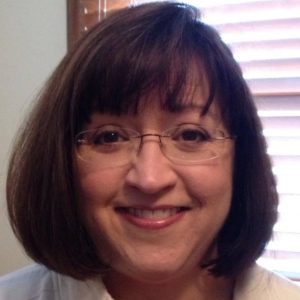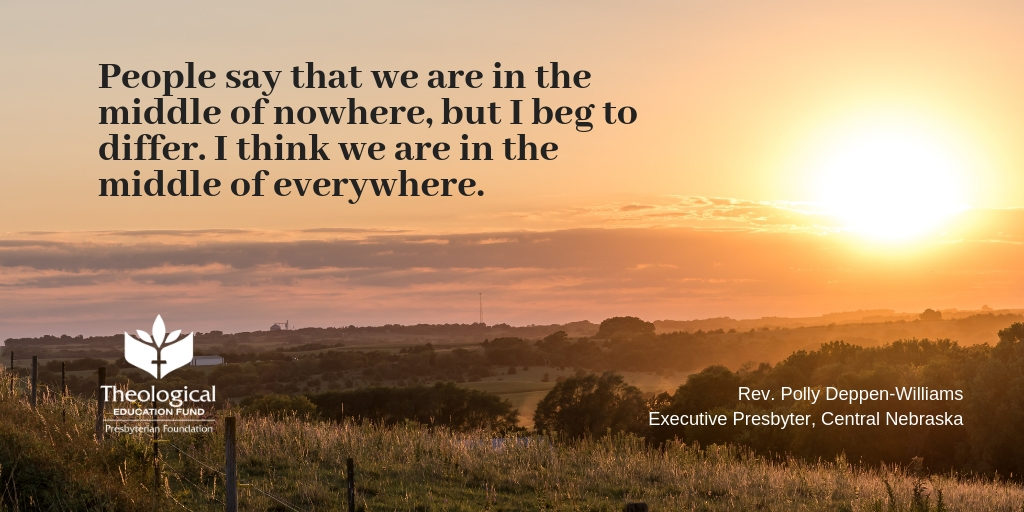God’s call to rural communities
October 4, 2018 by Polly Deppen-Williams
I’m an Executive Presbyter and Stated Clerk for a rural Presbytery in the Midwest, one of the great “flyover” states. People say that we are in the middle of nowhere, but I beg to differ. I think we are in the middle of everywhere. Let me tell you about the presbytery I serve, knowing that there are dozens of other presbyteries like it around the country . . .
Our presbytery is big — 32,500 square miles and 46 counties. It ranges from cattle country in the north to vast irrigated cornfields in the east to the river valley and its growing cities along the interstate. Our presbytery is also small – 36 churches with just under 4,000 members.

We are not your normal presbytery . . . I have served in four different presbyteries during my 26 years of ordained ministry. Most of the time, the presbytery divided itself according to theology. We do not do that here. We are a small collegial presbytery and we are committed to working together in our love of Christ, not divided according to theological ideology. Our pastors span the theological spectrum, and work incredibly well together. We even have lunch together once a month as a pastors’ group. Churches here are open to first call pastors and we have pastors with significant experience willing to serve as mentors.
We are rural . . . The largest city in our presbytery has a population of just over 50,000, and the city sizes drop precipitously after that. Rural though does not mean backwards. Smaller communities in our presbytery have seen a growth in local wineries and breweries, farm to table dining, and an influx of folks wanting to return to a simpler way of life with a lower cost of living compared to urban areas. Listening rooms and house concerts bring singer/songwriters to share their talents. Local libraries invite internationally known authors to speak and give writing workshops. Schools provide dual language education due to the rising number of immigrant populations who have come to provide the work force for the farming and ranching communities. And we have a number of thriving small liberal arts colleges, state university campuses and community colleges that bring additional cultural opportunities to our communities.
We are Presbyterian . . . Churches in these rural communities are reformed, authentic, hospitable and missional. They can support a called and installed pastor and their family with grace and love. Like our presbytery, our churches are theologically and politically diverse. As one pastor in our presbytery says, we have lots of purple churches that are full of vibrant and active people of faith.

We need you . . . Despite the current rhetoric in our denomination, we have churches looking for pastors. We need pastors to step out in faith and accept calls to serve churches in rural areas. In 2011, I moved from Florida to Nebraska, and I have been richly blessed by following God’s call to serve a church that I originally thought was in the middle of nowhere, but now I know that we are in the middle of everywhere!
If you are looking for a call, know that there are a number of rural presbyteries looking for faithful pastors. We hope you will consider joining us in Central Nebraska, or any of the dozens of other presbyteries like ours around the country.
Grace and peace,
Rev. Polly Deppen-Williams
Executive Presbyter and Stated Clerk
Presbytery of Central Nebraska
Blog Credit: https://www.presbyterianfoundation.org/gods-call-to-rural-communities/
Editor’s note: During October, we are going to explore the need for pastors in rural communities, with a focus on Nebraska. Executive Presbyter and Stated Clerk for the Presbytery of Central Nebraska Rev. Polly Deppen-Williams contacted us recently to discuss the need for pastors, and we decided to take a deep look at the need for pastors there as a microcosm for much of the rural U.S. What we’re hearing from Presbyteries is that there are plenty of openings in these rural communities, but not enough candidates. We’re going to explore all aspects of this, from the perspective of seminaries, from pastors who are serving in Nebraska and from churches that are seeking pastors. We will look at tough questions, such as the willingness of churches to call candidates who are diverse or who are first call pastors. We hope you’ll engage with us as we explore this topic. — Rev. Dr. Lee Hinson-Hasty, Theological Education Fund